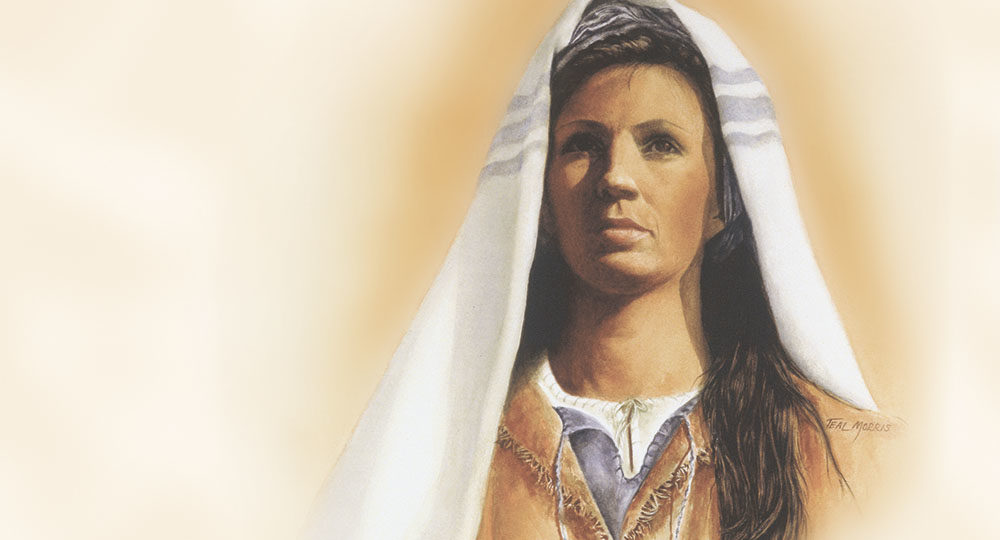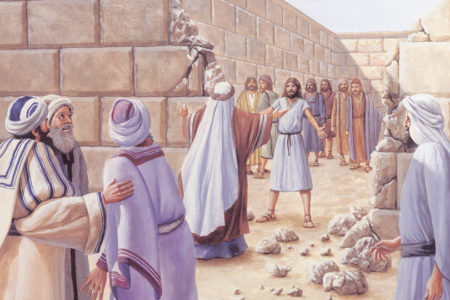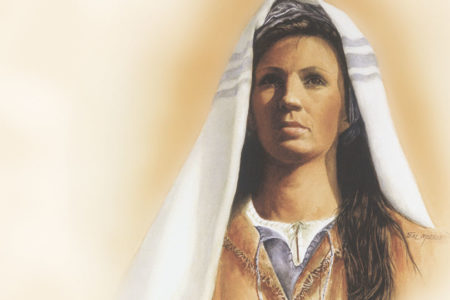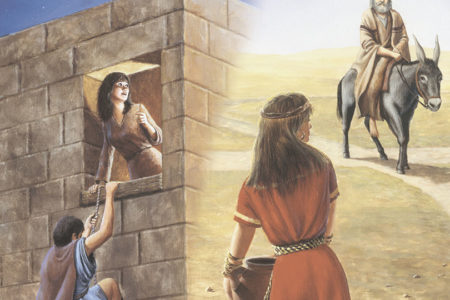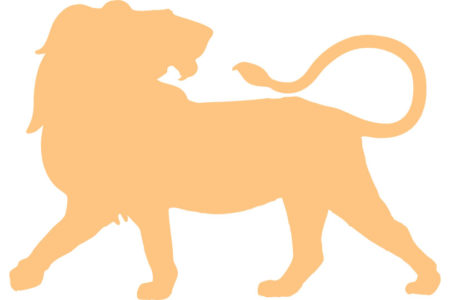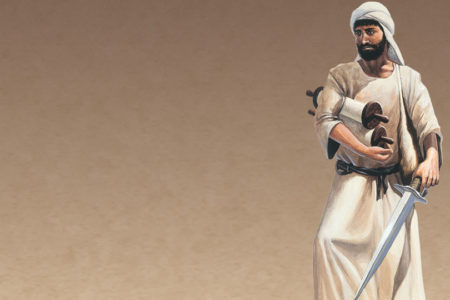Ruth: A Trophy of His Grace
There is a well-known children’s television show that uses music and games to teach simple math and reading and help youngsters understand difficult concepts, such as around, behind, underneath, alike, and different. To teach the concepts of alike and different, it usually presents three things that are clearly alike and one that is obviously different. Then it asks the children to decide which thing doesn’t belong.
To someone familiar with Old Testament law, Matthew 1:5 contains something that doesn’t belong—the name of Ruth, a Moabitess. By purely legal standards, she constitutes a serious breach in the lineage of the Jewish Messiah; but by divine standards, she is a magnificent trophy of the sovereignty and grace of God.
Her story is told in the Old Testament book that bears her name. During one of the bleakest periods in Israel’s history—the time of the judges, when everyone “did that which was right in his own eyes” (Jud. 21:25)—Ruth stands out as a woman of sweet humility and childlike faith. She came to the Promised Land a penniless, young, pagan widow clinging to her elderly mother-in-law, Naomi; and she left a legacy that included her great-grandson— King David, the sweetest psalmist of Israel—and his greater Son, the King of kings and Lord of lords.
Her story begins in Ruth 1:1: “Now it came to pass in the days when the judges ruled, there was a famine in the land. And a certain man of Bethlehemjudah went to sojourn in the country of Moab, he, and his wife, and his two sons.” God only sent famine during a time of judgment. Trying to flee the judgment, Elimelech took his wife, Naomi, and his two sons, Mahlon and Chilion, and went where the law forbade him to go—to a heathen nation. There he died. His sons married Moabite women with whom they had no children; and they, too, died. Naomi, elderly and empty, decided it was time to go home.
Orpah, Chilion’s widow, returned to her people. But something about Naomi had so strongly impacted Ruth that despite Naomi’s best efforts to dissuade her, Ruth vowed never to leave:
Entreat me not to leave thee, or to turn away from following after thee; for where thou goest, I will go; and where thou lodgest, I will lodge: thy people shall be my people, and thy God, my God. Where thou diest, will I die, and there will I be buried; the LORD do so to me, and more also, if anything but death part thee and me (Ruth 1:16-17).
So Ruth and Naomi left for Israel. Naomi could hardly have arrived in Bethlehem with anyone of a less desirable bloodline. The Moabites traced their lineage back to Lot. Moab was the name given to a son born from an incestuous relationship between a drunken Lot and his eldest daughter, following the destruction of Sodom and Gomorrah (Gen. 19).
The descendants of Moab later became a thorn in the side of the children of Israel. It was Moabite King Balak who paid Balaam, the prophet for hire, to curse the Jewish people (Num. 22—23). When that didn’t work and God blessed them instead, Balaam counseled Balak (Rev. 2:14) to force God’s hand by luring the Israelite men into fornication with Moabite women. This caused the Lord to send a plague that killed twenty-four thousand Israelites (Num. 25). Largely because of this sin at Baal-Peor, God commanded that no Moabite enter the congregation of the LORD “even to their tenth generation” (Dt. 23:3).
On the surface, this prohibition made Ruth an extremely unsuitable candidate for marriage to an Israelite. But God doesn’t look on the surface; He looks on the heart. So Ruth arrived in Bethlehem and gleaned in the fields, picking up what the reapers left behind. Gleaning was among God’s provisions for those who had nothing. But it was hard, backbreaking, humiliating work that generally yielded little. Often the grain was hard to reach, and the gleaner had to crawl in the dirt to get it.
Ruth was led by the Lord to glean in the fields of a godly man named Boaz, who “commanded his young men, saying, Let her glean even among the sheaves, and reproach her not; And let fall also some of the handfuls on purpose for her, and leave them, that she may glean them, and rebuke her not” (Ruth 2:15–16).
He told Ruth that the whole town knew she had left behind her Moabite family to become a stranger in a strange land. “The LORD recompense thy work,” he told her, “and a full reward be given thee by the LORD God of Israel, under whose wings thou art come to trust” (2:12).
That evening, Ruth came home with much grain. When Naomi inquired about it, Ruth told her of Boaz. “Blessed be he of the LORD,” declared Naomi, “who hath not withheld his kindness to the living andtothedead….Themanis near of kin unto us, one of our next kinsmen” (2:20). Naomi knew the law of levirate marriage and decided to seek Ruth’s wellbeing by giving her instructions that might secure for her a husband and a family.
It was the end of the barley harvest, and Boaz was spending the night at the threshing floor guarding the grain. Naomi told Ruth to wash, dress, and go to the threshing floor, but to remain inconspicuous. “And it shall be,” said Naomi, “when he lieth down, . . . thou shalt go in, and uncover his feet, and lie down; and he will tell thee what thou shalt do” (3:4).
While today this sounds odd, even immoral, it was completely consistent with Old Testament law. In Deuteronomy 25:5–6, God provided for levirate marriage to insure the continuation of the family line. Levirate stems from Latin and means “husband’s brother.”1 Ruth, a Moabitess, had no obligation to submit to the law of Israel. Yet she humbled herself under it and, in effect, asked Boaz, a man much older than she, to perform the service of the goël, or “kinsmanredeemer,” by marrying her according to Mosaic law, so she could bear a son to carry on her husband’s name.
Normally, this request would have been made in a public place such as the city gate. But because Ruth was a Moabitess and Naomi probably wanted to spare Boaz the public humiliation if he refused, she had Ruth go quietly to the threshing floor.
Struck by her loyalty and kindness, Boaz replied, “I will do to thee all that thou requirest; for all the city of my people doth know that thou art a virtuous woman” (3:11). He told her, however, that there was a nearer kinsman than he, who had to be given the opportunity first. Boaz said he would go to the gate on her behalf to ask the nearer kinsman.
True to his word, Boaz went to the city gate and confronted the nearer kinsman. After learning he would have to marry Ruth and “raise up the name of the dead upon his inheritance” (4:5), the man was unwilling.
“I cannot redeem it for myself,” he said, “lest I mar mine own inheritance. Redeem thou my right for thyself; for I cannot redeem it” (4:6). Being a kinsman-redeemer was costly. It involved assuming all debt and expense for someone else. In Ruth’s case, the goël would have all the expense of rearing a family and tending to property that, in the end, would never be his. The Bible doesn’t specify why the nearer kinsman refused. Perhaps he was married and already had a family to support. Whatever his reason, he counted the cost and was unwilling to become the redeemer. So Boaz stepped in and married Ruth, who became the mother of Obed, who became the father of Jesse, who became the father of David, the king of Israel.
The Scriptures teach that the Lord loves all His creation. He chose the Jewish people as His special vehicle to bring His truth, His Word, His Messiah, and, ultimately, Himself to the world. Placing a Moabite woman in the Messianic line underscores the fact that Messiah Jesus came to redeem all because He is not willing that any (Jewish or Gentile) should perish (2 Pet. 3:9). “God so loved the world” (Jn. 3:16) is not just New Testament theology—it is a biblical constant.
Like anyone else who comes to God God’s way, Ruth is a trophy of His divine grace. Despite her lineage, she embraced the God of Abraham, Isaac, and Jacob; and David, the greatest king of Israel who ever lived (other than Christ, Himself) was far fewer than ten generations removed from his Moabite heritage.
But the book of Ruth reveals another truth as well. It provides a beautiful picture of God’s redemption of mankind through Christ, our kinsman-redeemer. In the Garden of Eden, Adam and Eve sinned, plunging all humanity into estrangement from God. God promised to redeem that which was lost (Gen. 3:15). Hence God had to become man so He could become a near kinsman and purchase back what was His to begin with.
The apostle Paul, writing to the Philippians, explained this great truth: “Let this mind be in you, which was also in Christ Jesus, Who, being in the form of God, thought it not robbery to be equal with God, But made himself of no reputation, and took upon him the form of a servant, and was made in the likeness of men” (Phil. 2:5–7).
When He came to earth in the incarnation, Jesus assumed the form of a man. The word for “form” is the Greek word morphe, the root for the English word metamorphosis. Jesus has always been God; but He morphed, or changed, His outward appearance to take on the appearance of a man.
But that wasn’t enough. He then took on the form of the lowest kind of man—a slave, or bondservant. A bondservant willingly professed his loyalty and love for his master by publicly allowing an ear to be pierced with an awl (Ex. 21:5–6). From that moment on, he was forever identified with and bound to his master.
Jesus publicly professed His love for us and allowed His body to be pierced on the cross of Calvary. Before a body was created for Him (Heb. 10:5), Jesus was purely spirit, as is God the Father. When He became a man, however, he identified with humanity as a near kinsman; and that identification will endure forever. When we arrive in heaven, we will see in His body the marks of His love for us—and how that great love caused Him to forever mar His own inheritance to redeem us.
Ruth the Moabitess does indeed belong in the lineage of Messiah. Her place there is perfect. She was a woman of great and humble faith whom God still uses to show us that “by grace are ye saved through faith” (Eph. 2:8). In the words of hymn writer Julia H. Johnston, His grace is “marvelous, infinite, matchless grace, freely bestowed on all who believe; you that are longing to see His face, will you this moment His grace receive.”2
